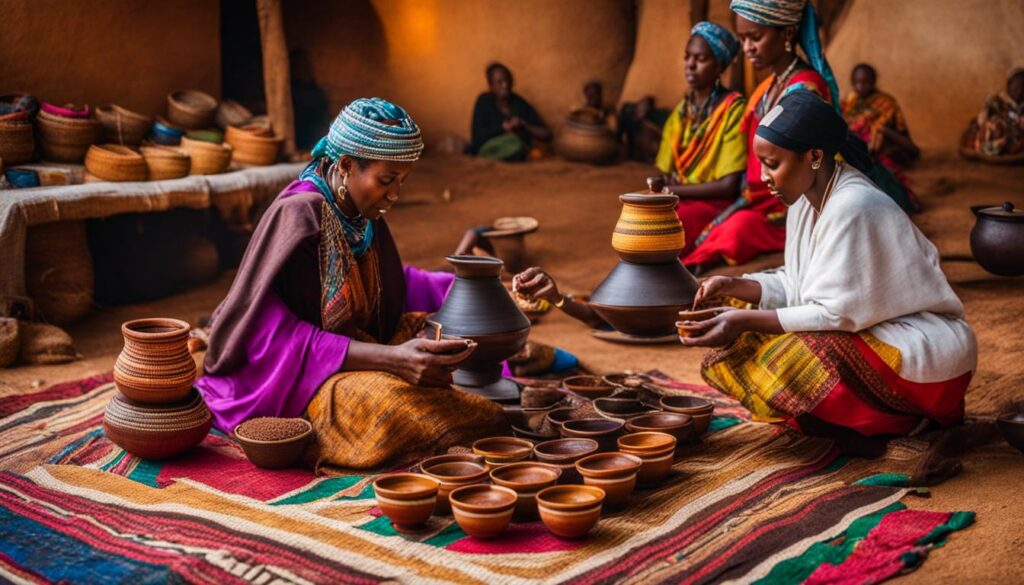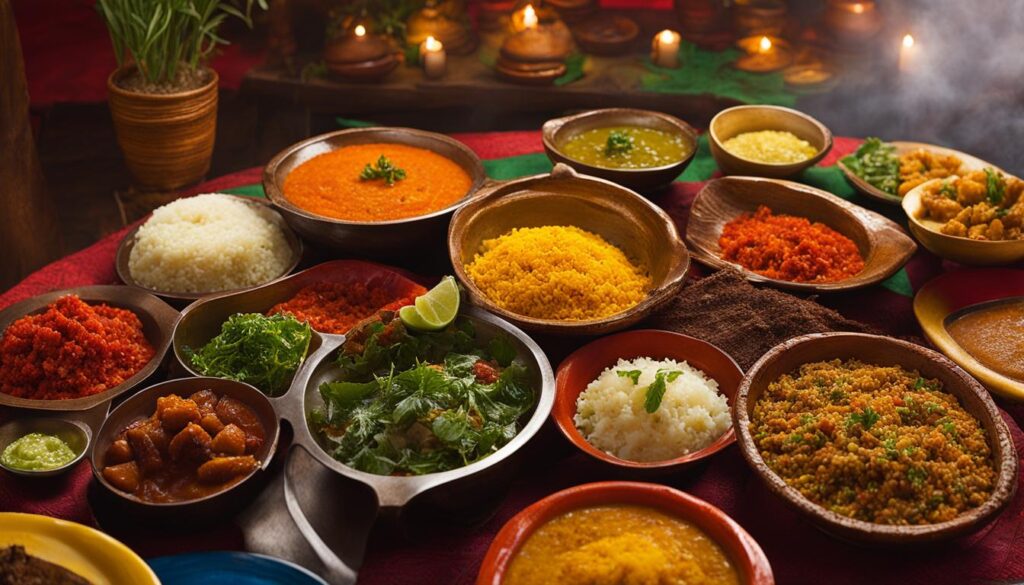Ethiopia boasts a fascinating culinary heritage, renowned for its aromatic spices, exotic flavors, and rich food culture. The traditional food and drink of Ethiopia reflect centuries-old traditions and offer a unique dining experience.
Ethiopian cuisine encompasses a wide range of dishes, from hearty stews to savory vegetarian fare. The star of Ethiopian cuisine is undoubtedly injera, a pancake-like flatbread made from teff flour. This versatile bread serves as the foundation for many traditional Ethiopian meals.
The rich flavors of Ethiopian cuisine are achieved through the skillful use of spices and cooking techniques. Ethiopian dishes are often prepared with a blend of spices, such as berbere, a fiery mix of chili peppers, garlic, ginger, and other seasonings. These bold flavors infuse each dish with a distinct taste that is sure to delight the adventurous palate.
Another highlight of Ethiopian food culture is the traditional coffee ceremony. Coffee holds great significance in Ethiopian culture, and the coffee ceremony is a cherished ritual. It involves the roasting, grinding, and brewing of coffee beans, which are then served in small cups accompanied by traditional snacks like popcorn or toasted barley.
Whether you’re a fan of spicy curries, flavorful stews, or vegetarian delights, Ethiopian cuisine offers something for everyone. Immerse yourself in the vibrant food culture of Ethiopia and savor the unique flavors that have been passed down through generations.
Key Takeaways:
- Ethiopian cuisine is known for its aromatic spices and exotic flavors.
- Injera, a pancake-like flatbread made from teff flour, is a staple in Ethiopian meals.
- Ethiopian dishes are prepared with a blend of spices, such as berbere.
- The traditional coffee ceremony is a cherished ritual in Ethiopian culture.
- Explore the diverse and delicious flavors of Ethiopian cuisine to truly experience the country’s culinary heritage.
How to Eat Ethiopian Food
Eating Ethiopian food is a unique and culturally rich experience. Ethiopian cuisine is traditionally enjoyed communally, with everyone gathering around a large platter of food and using their hands to eat. It may seem unfamiliar at first, but it’s a fantastic way to connect with the food and the people around you.
“Ethiopian cuisine is all about sharing and togetherness. The communal dining style creates a sense of community and bonding among diners,” says Chef Selam, an Ethiopian cuisine expert.
One of the key elements of Ethiopian food etiquette is using injera, a spongy flatbread, to scoop up the various dishes. Tear off a piece of injera with your right hand and use it to grab a bit of the main dish. The injera serves as both a utensil and a base for the flavorful curries and stews.
Ethiopian eating customs
In addition to using injera, there is a unique custom called gursha, which involves feeding one another as a sign of friendship and love. It’s a gesture that fosters a sense of closeness and connection. So don’t be surprised if someone offers you a gursha during the meal!
Ethiopian coffee ceremony
The traditional Ethiopian coffee ceremony is another significant part of the culture. It is a ritualistic event that involves roasting, grinding, and brewing coffee beans in a traditional clay pot called a jebena. The freshly brewed coffee is served in small cups and enjoyed after the meal. Accompanied by snacks such as popcorn or toasted barley, the ceremony is a time for relaxation and socializing.
Best Ethiopian Dishes
Ethiopian cuisine offers a wide array of delicious and flavorful dishes that are sure to tantalize your taste buds. One of the most iconic and essential components of Ethiopian cuisine is injera, a spongy and slightly sour pancake-like flatbread made from teff flour. It serves as the base for many traditional dishes and is the perfect vessel for scooping up flavorful stews and curries.
Wat: Spicy Ethiopian Curry
Wat is a popular Ethiopian dish that is known for its rich and spicy flavors. It is a thick and hearty curry made with a variety of meats like beef, chicken, or lamb, cooked with a blend of aromatic spices such as berbere, a traditional Ethiopian spice mixture. The slow-cooked meat becomes tender and infused with the bold flavors of the spices, creating a dish that is both comforting and satisfying.
Tibs: Sautéed Meat Delight
Tibs is another beloved Ethiopian dish consisting of sautéed meat, usually beef or lamb, cooked with onions, garlic, and a medley of spices. The meat is typically marinated beforehand to enhance its flavor and tenderness. Tibs can be enjoyed in various ways, such as served with injera or as a filling for sandwiches or wraps. The combination of tender meat and aromatic spices makes Tibs a must-try Ethiopian delicacy.
Firfir: Spicy Breakfast Delight
For a spicy and flavorful breakfast, look no further than Firfir. This dish is made by shredding and sautéing injera with spices, usually berbere, and mixing it with flavorful sauces. It is often served with a side of yogurt or cottage cheese to balance the spiciness. The unique combination of textures and flavors in Firfir makes it a popular breakfast choice among Ethiopians.
Ethiopian Coffee and Traditional Beverages

Ethiopian coffee holds a special place in the country’s culture and is renowned for its high quality. The traditional Ethiopian coffee ceremony is a significant social and cultural event, involving the brewing and serving of coffee in a traditional clay pot called a jebena.
The ceremony starts with roasting the coffee beans over an open flame, filling the air with a rich aroma. Once roasted, the beans are ground and brewed with hot water in the jebena. The coffee is then poured into small cups, and it is common for the first cup to be poured and shared among family and guests as a symbol of hospitality.
Ethiopian Coffee Ceremony: A Celebration of Culture and Community
“The Ethiopian coffee ceremony is more than just serving coffee; it is a celebration of culture and community. It is a time for friends and family to come together, share stories, and enjoy the flavors of the traditional Ethiopian coffee.”
In addition to coffee, Ethiopia is also famous for its traditional beverages like Tej, a honey wine made with gesho leaves and twigs. Tej has been enjoyed in Ethiopia for centuries and is often served in special occasions and festive gatherings. It has a unique flavor profile that is sweet, aromatic, and slightly effervescent.
Ethiopian fruit juices are another popular choice among locals and visitors. These juices are made from a variety of fresh fruits, including avocado, watermelon, and mango. They’re perfect for quenching thirst and provide a refreshing taste of Ethiopia’s tropical fruits.
Whether it’s the aromatic Ethiopian coffee or the flavorful traditional beverages like Tej and fruit juices, experiencing the rich flavors of Ethiopian drinks is an essential part of immersing oneself in Ethiopian culture and cuisine.
Where to Eat in Ethiopia

When it comes to experiencing the authentic flavors of traditional Ethiopian cuisine, there are several restaurants in Ethiopia that offer a delightful culinary journey. One highly recommended option is the Yod Abyssinia Cultural Restaurant located in Addis Ababa. Not only does this restaurant serve delicious Ethiopian dishes, but it also provides a cultural dance show, adding to the overall dining experience.
Another fantastic choice is Shembeket, a restaurant situated in Dessie. Here, visitors can savor traditional Ethiopian food prepared with great care and authenticity. The restaurant’s warm and inviting atmosphere complements the rich flavors of the cuisine, making it a memorable dining experience.
For those exploring the historical town of Lalibela, Ben Abeba is a must-visit restaurant. This unique establishment offers breathtaking views and a menu inspired by Ethiopian culinary traditions. Guests can enjoy traditional dishes while enjoying stunning vistas, creating a dining experience that is both satisfying to the palate and the senses.
The Four Sisters Restaurant
“The Four Sisters Restaurant in Gonder is another gem that should not be missed. With its traditional Ethiopian décor and warm ambiance, this restaurant offers a wide selection of traditional dishes served with genuine Ethiopian hospitality. It’s a perfect spot for immersing oneself in the local food culture and trying different flavors of Ethiopia.”
– Local Food Enthusiast
Whether you choose to dine at Yod Abyssinia Cultural Restaurant, Shembeket, Ben Abeba, or The Four Sisters Restaurant, you can indulge in the richness of Ethiopian cuisine and experience the country’s vibrant culinary traditions. These establishments provide a perfect opportunity to explore the local food scene and create lasting memories through the flavors of Ethiopia.
Conclusion
Traditional Ethiopian food and drink are a testament to the country’s rich cultural heritage and diverse culinary traditions. From the staple injera bread to the flavorful curries, sautéed meats, and vegetarian dishes, Ethiopian cuisine offers an array of delicious flavors and unique dining experiences. The traditional beverages, including Ethiopian coffee and honey wine, add another layer of richness to the food culture.
When visiting Ethiopia, exploring the local food scene and trying traditional dishes is a must to fully immerse oneself in the country’s unique culinary traditions. Whether enjoying a communal meal with friends and family, experiencing the Ethiopian coffee ceremony, or savoring the diverse flavors of injera and spicy curries, the culinary journey through Ethiopia is sure to be unforgettable.
So, if you’re a food enthusiast looking for new and exciting flavors, or a traveler eager to experience the authentic tastes of a country’s culture, make sure to put Ethiopian cuisine on your must-try list. The combination of aromatic spices, exotic flavors, and vibrant communal dining traditions will leave you with incredible memories and a deep appreciation for the culinary treasures of Ethiopia.
Other Related Articles
-
Traditional Food and Drink of Botswana
-
Traditional Food and Drink of Ethiopia
-
Traditional Food and Drink of Eritrea
-
Traditional Food and Drink Of Ghana
-
Traditional Food and Drink Of Kenya
-
Ethiopia: The Diets of The Past and The Present
-
Exploring Past and Present Diets of Eritrea
-
Exploring Past and Present Diets of Botswana
FAQ
What is traditional Ethiopian cuisine known for?
Traditional Ethiopian cuisine is known for its aromatic spices and exotic flavors.
What is injera?
Injera is a pancake-like flatbread made from teff flour and is a staple in Ethiopian meals. It is often served with various stews and curries.
How is Ethiopian food traditionally eaten?
Ethiopian food is traditionally shared and enjoyed communally. Diners gather around a large platter of food and use their hands to eat, using injera to scoop up the various dishes.
What is gursha in Ethiopian food etiquette?
Gursha is the act of feeding one another as a sign of friendship and love.
What are some popular traditional Ethiopian dishes?
Some popular traditional Ethiopian dishes include Wat (a spicy Ethiopian curry made with meat), Tibs (sautéed meat served with vegetables), and Firfir (a spicy dish made with shredded injera for breakfast).
What is the traditional Ethiopian coffee ceremony?
The traditional Ethiopian coffee ceremony is a social and cultural event that involves the brewing and serving of coffee in a traditional clay pot called a jebena. It is often accompanied by snacks such as popcorn or toasted barley.
What are some traditional Ethiopian beverages?
Traditional Ethiopian beverages include Ethiopian coffee, Tej (a honey wine made with gesho leaves and twigs), and refreshing fruit juices made with a mix of avocado, watermelon, and mango.
Where can I try authentic traditional Ethiopian food?
Some recommended restaurants for trying traditional Ethiopian dishes in Ethiopia include Yod Abyssinia Cultural Restaurant in Addis Ababa, Shembeket in Dessie, Ben Abeba in Lalibela, and The Four Sisters Restaurant in Gonder.



